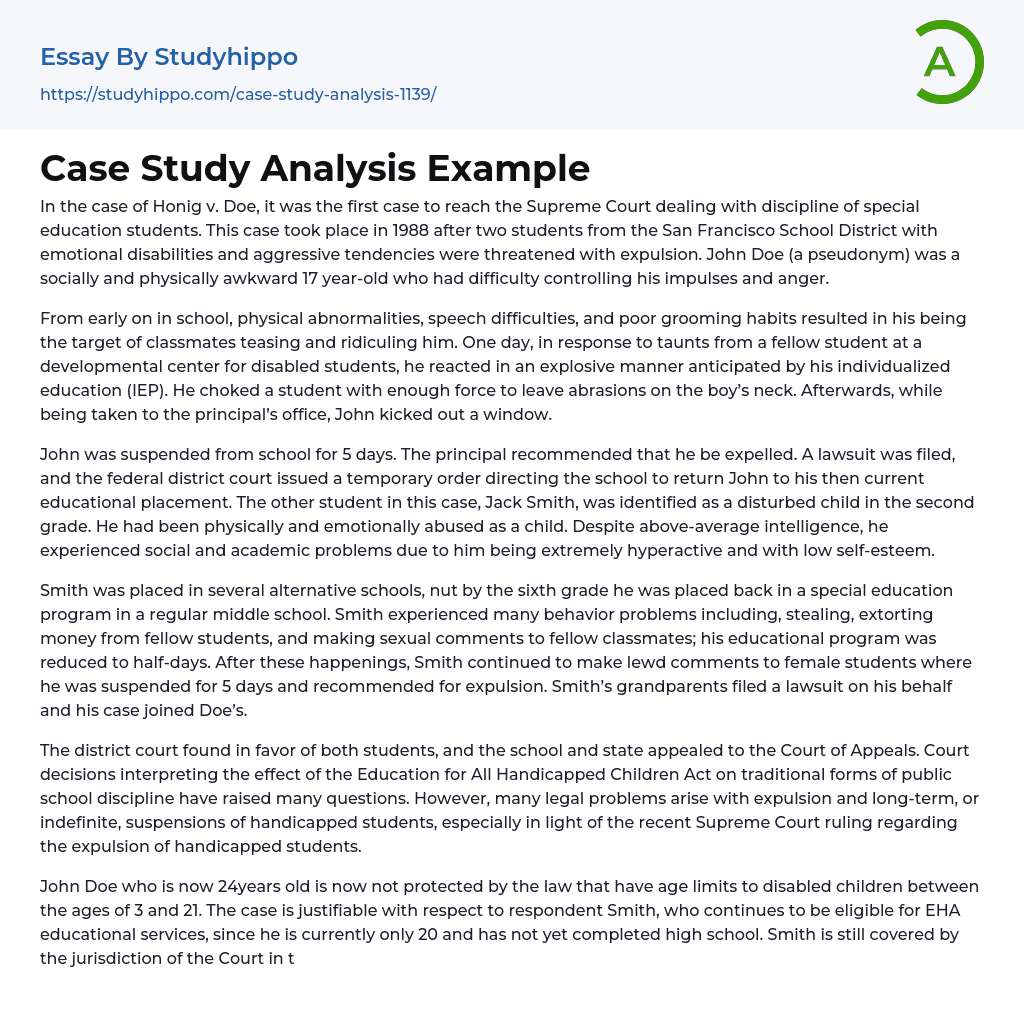The Honig v. Doe case is significant for being the initial Supreme Court case that dealt specifically with disciplining special education students. In 1988, two students who had emotional disabilities and displayed aggressive behavior were at risk of expulsion from the San Francisco School District. One of these students, a 17-year-old referred to as John Doe (a pseudonym), encountered difficulties in controlling his impulses and anger while simultaneously confronting social and physical obstacles.
Throughout his time in school, this individual faced physical abnormalities, speech difficulties, and lack of proper grooming, making him an easy target for teasing and ridicule from his classmates. At a developmental center for disabled students, he finally reached his breaking point when a fellow student taunted him, resulting in an explosive reaction that was predicted by his individualized education plan (IEP). H
...e excessively choked the student, leaving visible abrasions on the boy's neck. During the process of being escorted to the principal's office, John expressed further aggression by kicking out a window. This incident led to a 5-day suspension from school, while the principal went as far as to recommend John's expulsion.
The federal district court filed a lawsuit and issued a temporary order for the school to return John to his current educational placement. Another student named Jack Smith, who was labeled as disturbed in second grade, experienced physical and emotional abuse as a child. Despite having above-average intelligence, he faced social and academic challenges due to hyperactivity and low self-esteem. Smith attended multiple alternative schools but eventually returned to a special education program in a regular middle school by sixth grade. He exhibited behavioral issues such as stealing, extorting money fro
peers, and making inappropriate comments to classmates. Consequently, his educational program was reduced to half-days.
Smith was suspended for 5 days and recommended for expulsion after making lewd comments to female students. His grandparents filed a lawsuit on his behalf and his case joined Doe’s. The district court ruled in favor of both students, but the school and state appealed to the Court of Appeals. Court decisions regarding the Education for All Handicapped Children Act and public school discipline have sparked numerous questions. Expulsion and long-term suspensions of handicapped students present legal challenges, particularly in light of a recent Supreme Court ruling on the matter.
John Doe, who is now 24 years old, no longer falls under the protection of the law that defines age limits for disabled children between ages 3 and 21. This decision is based on respondent Smith's eligibility for EHA educational services. At present, Smith is 20 years old and still attending high school, which means he remains under the jurisdiction of the Court due to a reasonable likelihood of future deprivation of his rights mandated by EHA. Smith has not provided any evidence regarding his social functioning or ability to overcome behavioral issues. Thus, it is reasonable to anticipate aggressive and disruptive behavior from him in the classroom. Consequently, placing him in future educational programs without expecting disruptions would be unreasonable.
References
- Honig V. Doe, 484 U. S. 305 (1988)
- Bartlett, Larry, Exceptional Children, Jan. 1989
- Yudof, Mark, Educational Policy and the Law, 4th edition Essex, Nathan L.
, School Law and the Public Schools,
- Peer Group essays
- Agreement essays
- Business Law essays
- Common Law essays
- Community Policing essays
- Constitution essays
- Consumer Protection essays
- Contract essays
- Contract Law essays
- Copyright Infringement essays
- Court essays
- Crime essays
- Criminal Law essays
- Employment Law essays
- Family Law essays
- Injustice essays
- Judge essays
- Jury essays
- Justice essays
- Lawsuit essays
- Lawyer essays
- Marijuana Legalization essays
- Ownership essays
- Police essays
- Property essays
- Protection essays
- Security essays
- Tort Law essays
- Treaty essays
- United States Constitution essays
- War on Drugs essays
- Classroom essays
- College essays
- E-Learning essays
- Elementary School essays
- Examination essays
- Graduate School essays
- High School essays
- History Of Education essays
- Homeschooling essays
- Kindergarten essays
- Middle School essays
- Public School essays
- School essays
- Single Sex Schools essays
- Special Education essays
- Student essays
- Teacher essays
- University essays
- Vocational Education essays




